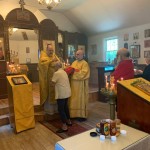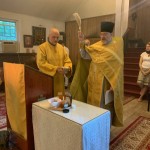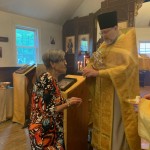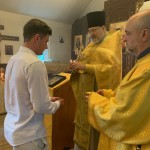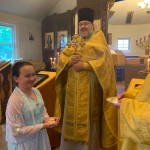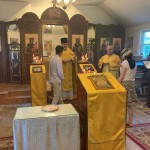On August 13, on the 10th Sunday after Pentecost, our parish had a nice celebration. Our Rector, Archpriest Igor Tarasov served the Divine Liturgy in our temple. After the readings from the Sacred Scripture he preached the following homily:
“Dear brothers and sisters in Christ! Today we celebrate 10th Sunday after Pentecost, and I made a decision to begin preaching on the Epistle lessons. Usually, we reflect upon the readings from the Holy Gospel but the Church also has the readings from the Epistles. The Epistles are also from the Sacred Scripture, from the New Testament. They were written by the Holy Apostles. Most of the readings from the Epistles we have on Sundays are from the letters of the Holy Apostle Paul. Today we had a lesson from his Epistle to the Corinthians”.
“In today’s Epistle lesson St. Paul is telling the Christians of Corinth that they differ from the Apostles by their way of life. He exclaims, “We are fools for Christ’s sake, but you are wise in Christ!” (1 Cor. 4, 10). If we tried to understand these words literally, we could think that St. Paul gives an option to be fools in Christ or to be wise in Christ. However, it is easy to understand that he is sarcastic”.
“Corinthian Christians who were relatively new community founded by St. Paul himself, became relaxed and attempted to combine Christian faith with some luxury of secular life. They tried to be Christians and preserve some worldly attitude. This is why St. Paul uses irony and sarcasm. He hopes that it could be a good medicine to cure spiritual weaknesses of his followers in Corinth. He says, “We are fools for Christ’s sake, but you are wise in Christ! We are weak, and you are strong! You are distinguished, but we are dishonored!” (1 Cor. 4, 10). And he goes on telling that the Apostles, including himself, hunger and thirst, are poorly clothed, are beaten and homeless. They labor, working with their own hands. They are persecuted and reviled (1 Cor. 4, 11-12). At the same time Christians of Corinth are not suffering these misfortunes, but think that they are still good followers of Christ. This why the Apostle does not condemn them directly but teaches that they are wrong. You cannot be a good Christian and not suffer for Christ. You cannot serve two masters, as the Lord Himself said (Mt. 6, 24)”.
“Nowadays many Christians and even Christian communities believe that they can adopt their Christianity to modern life, to the demands of the secular world. They think that they can combine Christian faith with the worldly existence. They abbreviate church services, make their temples comfortable, allow the people to indulge themselves. Some of them now agree to bless same-sex marriages or pray for the pet animals. In one of such “churches” some time ago a minister gave Communion to a dog. They probably think that they are “wise in Christ” for they wish to be “popular”, “close to the people”, to attract today’s people. Thus they may think that they are strong and distinguished. While we, Orthodox Christians who do not wish to do that are viewed as “fools”, as “weak” and “dishonored”. Well, the same way the Apostles were viewed”.
“But even among us, Orthodox, sometimes there is a spirit of the early Corinthian church. We have a temptation to combine our Christianity with the secular values. This is why we have different problems in our parishes. Something resembling the situation of St. Paul and other Apostles may be seen in our Church life in this country. Many our priests are not supported by their parishes, but have to labor, work with their own hands or other talents. On their time off they take care of the parishes, come to serve the Liturgy. But some parishioners have their requirements they set for the clergy. Similar situation as described today by St. Paul”.
“However, St. Paul uses these words of irony, as he himself says, “not to shame” but “to warn” his disciples in Corinth. The Corinthian Christians were his spiritual children. As in the family, so in the Church, children need parental guidance. Same in our Orthodox communities, in our parishes, people need guidance from the clergy. Since St. Paul founded the community in Corinth, he is the father of the Corinthian Christians. As such he finishes today’s Epistle lesson with the words, “Therefore I urge you, imitate me” (1 Cor. 4, 16). This would mean that Corinthians should imitate the Apostles, become fools in Christ, become persecuted and endure sufferings for Christ’s sake. They should abandon their way of life and follow the example of St. Paul and other Apostles”.
“Therefore, dear brethren, let us imitate St. Paul and other holy Apostles who imitated our Lord Jesus Christ. Let us not fool ourselves that we may be good Christians and serve the world, combine our faith with secular values. Let us remember who our fathers are and be their followers”.
During preparation for Holy Communion the choir director nicely performed hymns dedicated to the Holy Cross because of the celebration of the prefeast of the Transition of the Precious Woods of the Cross. She also sang the hymns dedicated to St. Eudocimus whose memory was celebrated.
Following the Ambo prayer the Rector performed the traditional blessing of honey.
After the dismissal of the Liturgy Fr. Igor greeted Paraskeva Kosmidis on her past name day. He also congratulated our new parishioner Ilya on his name day celebrated two weeks ago. Traditional Polychronion was proclaimed on their behalf and Theotokian prosphora distributed among those two persons. Then the Rector congratulated Elena Malyshev on her past birthday and also proclaimed the Polychronion for her. After these greetings the Rector made the announcements regarding the Dormition Fast which starts on the next day and regarding our coming celebration of the Lord’s Transfiguration.
Following the services the Rector and parishioners enjoyed delicious food and nice conversation during the coffee hour.

